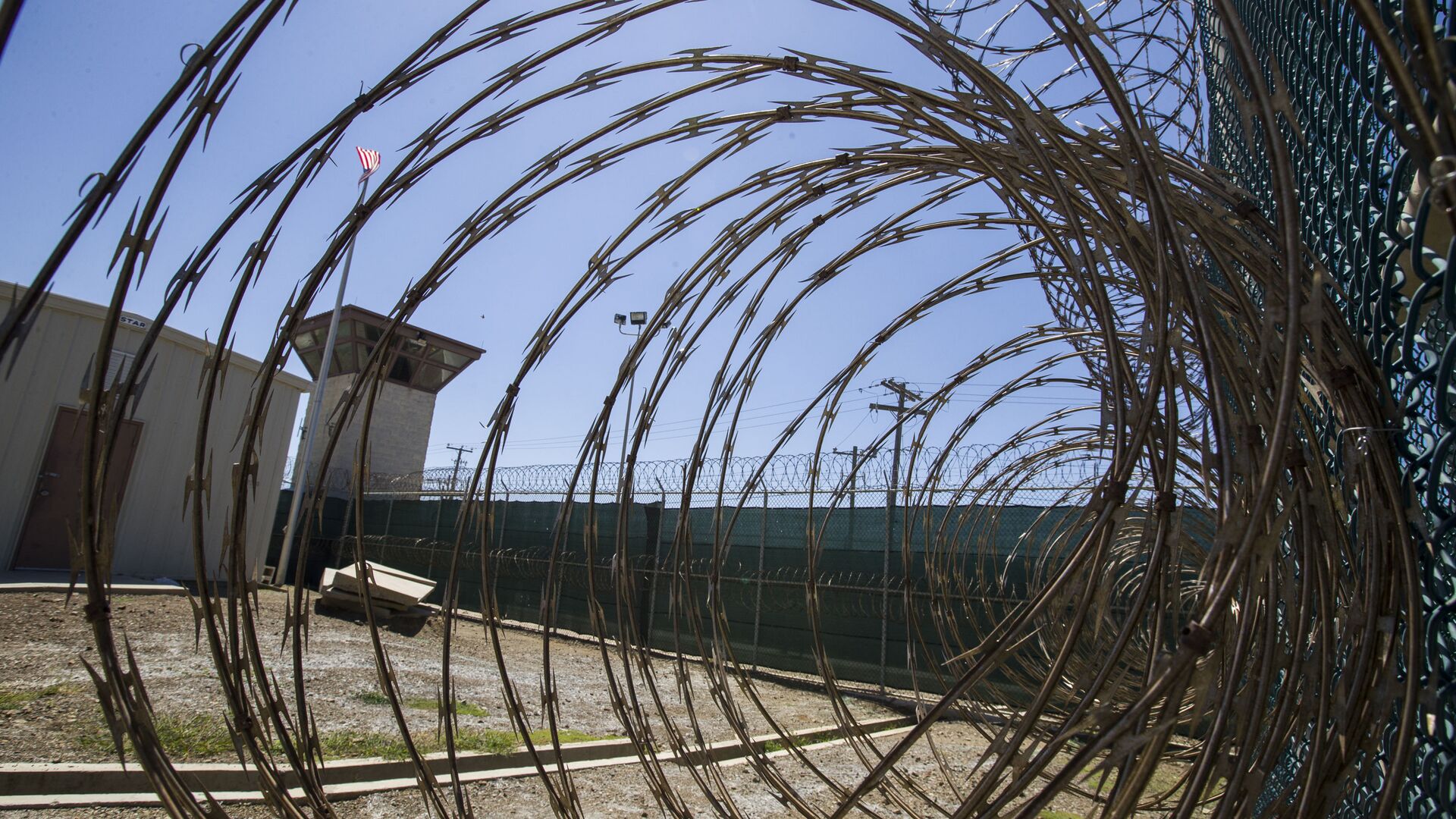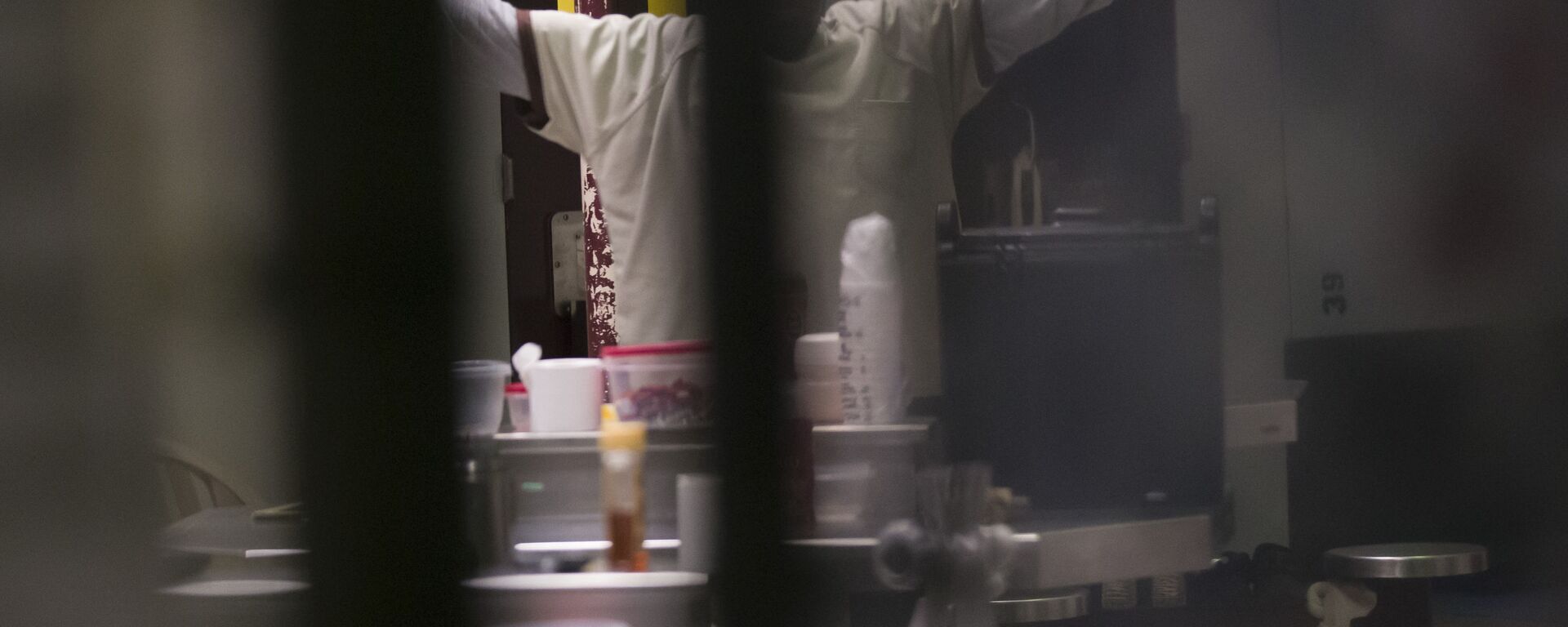https://sputnikglobe.com/20211007/us-supreme-court-pushes-government-to-allow-guantanamo-detainee-to-testify---report-1089722984.html
US Supreme Court Pushes Government to Allow Guantanamo Detainee to Testify - Report
US Supreme Court Pushes Government to Allow Guantanamo Detainee to Testify - Report
Sputnik International
According to a report, US Supreme Court justices on Wednesday questioned the US government’s decision in not allowing a suspected high-ranking al-Qaeda* figure... 07.10.2021, Sputnik International
2021-10-07T00:33+0000
2021-10-07T00:33+0000
2021-10-07T00:38+0000
abu zubaydah
us
guantanamo bay detention center
https://cdn1.img.sputnikglobe.com/img/07e5/05/03/1082788023_0:160:3073:1888_1920x0_80_0_0_bc2c170b9550d7afe8c0d296408a1926.jpg
Both liberal and conservative Supreme Court justices pressed US Solicitor General Brian Fletcher on the subject, as the court faced turmoil in the government’s decision to prevent two previous CIA contractors from being questioned in a criminal investigation in Poland’s "black site" examining the treatment of detainee Abu Zubaydah.Supreme Court Justice Neil M. Gorsuch was amongst the few justices that appeared to see the option of Zubaydah testifying himself as an alternative after being skeptical that Zubaydah’s lawyers could overcome the government’s national security arguments.Gorsuch was joined by liberal Justice Stephen Breyer, who asked why Zubaydah was still in Guantanamo Bay after 15 years, especially after having never been charged with a crime. "I don't understand why he is still there," Breyer said.Justice Sonia Sotomayor pushed Fletcher to provide a "clear answer — without invoking state secret or other privilege."Fletcher’s response was that the request had to be taken back to the Defense Department, which is holding the detainee. According to Zubaydah’s lawyer, David Klein, he is allegedly not permitted to testify under the conditions of his Guantanamo confinement.The central issue of the case concerns Zubaydah, 50, who spent 15 years at Guantanamo after allegedly being “an associate and longtime terrorist ally of Osama bin Laden,” a Justice Department filing read.Zubaydah was the first prisoner held by the CIA to undergo extensive torture. Aside from being blind, he is said to have endured waterboarding - a harsh interrogation technique that causes one to experience the sensation of drowning - as much as 83 times in just a single month, according to US government documents.The detainee is requesting a subpoena testimony from the CIA contractors who supervised his torture, as the government appeals a lower court ruling that contractors James Elmer Mitchell and John Bruce Jessen could be subpoenaed under a US law that lets federal courts enforce a request for testimony or other evidence for a foreign legal proceeding.Zubaydah’s lawyers have pushed Mitchell and Jessen to testify and provide documents in the criminal investigation in Poland — a location that is believed to be a CIA “black site” where harsh interrogation techniques were used.To prevent them from being questioned and allegedly jeopardizing national security, the US government has asserted what is known as the "state-secrets privilege.”Two psychologists who supervised Zubaydah's torture took over when the FBI failed to come up with the information that the CIA thought Zubaydah had.In 2010, Zubaydah’s attorneys filed a criminal complaint in Poland to hold Polish officials accountable for their complicity in his "unlawful detention and torture." However, the US government refused to provide the information on grounds of national security. The move subsequently resulted in Zubaydah's lawyer filing an appeal to the European Court on Human Rights, prompting a reopening of the Polish investigation.A testimony from the two psychologists that had supervised Zubaydah’s questioning was sought in the US shortly after.A Supreme Court ruling is due by the end of June.*Al-Qaeda is a terrorist organization banned in Russia and many other countries.
https://sputnikglobe.com/20210427/us-supreme-court-to-hear-gitmo-prisoners-zubaydah-interrogation-torture-case-1082735482.html
Sputnik International
feedback@sputniknews.com
+74956456601
MIA „Rossiya Segodnya“
2021
News
en_EN
Sputnik International
feedback@sputniknews.com
+74956456601
MIA „Rossiya Segodnya“
Sputnik International
feedback@sputniknews.com
+74956456601
MIA „Rossiya Segodnya“
abu zubaydah, us, guantanamo bay detention center
abu zubaydah, us, guantanamo bay detention center
US Supreme Court Pushes Government to Allow Guantanamo Detainee to Testify - Report
00:33 GMT 07.10.2021 (Updated: 00:38 GMT 07.10.2021) According to a report, US Supreme Court justices on Wednesday questioned the US government’s decision in not allowing a suspected high-ranking al-Qaeda* figure held at the American naval base at Guantanamo Bay, Cuba, to testify about the torture he endured at the hands of the CIA.
Both liberal and conservative Supreme Court justices
pressed US Solicitor General Brian Fletcher on the subject, as the court faced turmoil in the government’s decision to prevent two previous CIA contractors from being questioned in a criminal investigation in Poland’s "black site" examining the treatment of detainee
Abu Zubaydah.
Supreme Court Justice Neil M. Gorsuch was amongst the few justices that appeared to see the option of Zubaydah testifying himself as an alternative after being skeptical that Zubaydah’s lawyers could overcome the government’s national security arguments.
“Why not make the witness available?” asked the conservative justice, referring to Zubaydah. “What is the government’s objection to the witness testifying in his own treatment and not requiring any addition from the government of any kind?”
Gorsuch was joined by liberal Justice Stephen Breyer, who asked why Zubaydah was still in Guantanamo Bay after 15 years, especially after having never been charged with a crime. "I don't understand why he is still there," Breyer said.
Justice Sonia Sotomayor pushed Fletcher to provide a "clear answer — without invoking state secret or other privilege."
Fletcher’s response was that the request had to be taken back to the Defense Department, which is holding the detainee.
"We cannot offer that now. It's a request that has not been made,” Fletcher said. He added that as he could not commit to him testifying, and that he would get back to the court on the issue.
According to Zubaydah’s lawyer, David Klein, he is allegedly not permitted to testify under the conditions of his Guantanamo confinement.
The central issue of the case concerns Zubaydah, 50, who spent 15 years at Guantanamo after allegedly being “an associate and longtime terrorist ally of Osama bin Laden,” a Justice Department filing read.
Zubaydah was the first prisoner held by the CIA to undergo extensive torture. Aside from being blind, he is said to have endured waterboarding - a harsh interrogation technique that causes one to experience the sensation of drowning - as much as 83 times in just a single month, according to US government documents.
The detainee is requesting a subpoena testimony from the CIA contractors who supervised his torture, as the government appeals a lower court ruling that contractors James Elmer Mitchell and John Bruce Jessen could be subpoenaed under a US law that lets federal courts enforce a request for testimony or other evidence for a foreign legal proceeding.
Zubaydah’s lawyers have pushed Mitchell and Jessen to testify and provide documents in the criminal investigation in Poland — a location that is believed to be a CIA “black site” where harsh interrogation techniques were used.
To prevent them from being questioned and allegedly jeopardizing national security, the US government has asserted what is known as the "state-secrets privilege.”
Two psychologists who supervised Zubaydah's torture took over when the FBI failed to come up with the information that the CIA thought Zubaydah had.
In 2010, Zubaydah’s attorneys filed a criminal complaint in Poland to hold Polish officials accountable for their complicity in his "unlawful detention and torture." However, the US government refused to provide the information on grounds of national security. The move subsequently resulted in Zubaydah's lawyer filing an appeal to the European Court on Human Rights, prompting a reopening of the Polish investigation.
A testimony from the two psychologists that had supervised Zubaydah’s questioning was sought in the US shortly after.
A Supreme Court ruling is due by the end of June.
*Al-Qaeda is a terrorist organization banned in Russia and many other countries.


